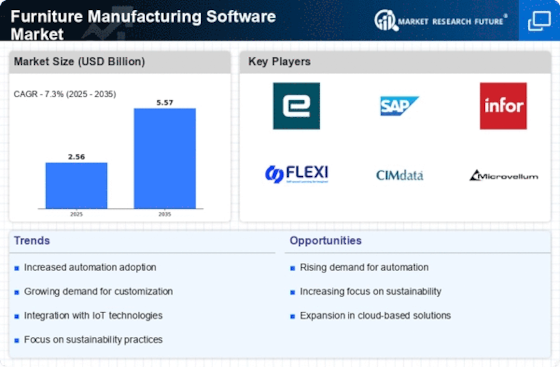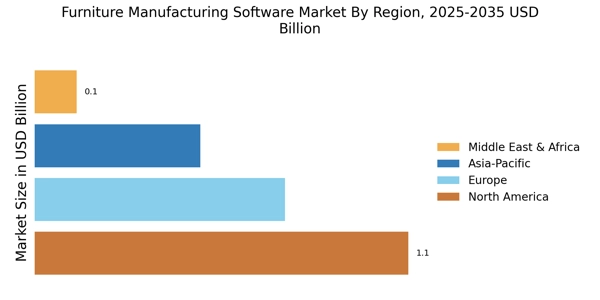Rising Demand for Automation
The Furniture Manufacturing Software Market is experiencing a notable surge in demand for automation solutions. As manufacturers seek to enhance operational efficiency, the integration of automated processes becomes increasingly vital. Automation not only streamlines production workflows but also minimizes human error, thereby improving product quality. According to recent data, the adoption of automation technologies in manufacturing has led to a 20% increase in productivity across various sectors. This trend is particularly pronounced in the furniture sector, where companies are leveraging software to automate inventory management, order processing, and production scheduling. Consequently, the growing emphasis on automation is likely to drive the expansion of the Furniture Manufacturing Software Market, as businesses strive to remain competitive in a rapidly evolving landscape.
Growing Emphasis on Data Analytics
The Furniture Manufacturing Software Market is witnessing a growing emphasis on data analytics as manufacturers seek to leverage insights for informed decision-making. The ability to analyze production data, customer preferences, and market trends is becoming increasingly crucial for businesses aiming to enhance their competitive edge. Recent studies indicate that companies utilizing data analytics in their operations experience a 15% improvement in overall efficiency. By harnessing data analytics, manufacturers can identify inefficiencies, forecast demand, and tailor their offerings to meet customer needs more effectively. This trend is likely to drive the adoption of sophisticated software solutions that incorporate data analytics capabilities, thereby contributing to the growth of the Furniture Manufacturing Software Market. As manufacturers strive to make data-driven decisions, the demand for analytics-driven software solutions is expected to rise.
Shift Towards Cloud-Based Solutions
The Furniture Manufacturing Software Market is experiencing a significant shift towards cloud-based solutions. As manufacturers increasingly adopt cloud technology, they benefit from enhanced flexibility, scalability, and accessibility. Cloud-based software allows for real-time collaboration among teams, regardless of geographical location, which is particularly advantageous in today's interconnected world. Furthermore, the cloud enables manufacturers to reduce IT infrastructure costs and streamline software updates. Recent data suggests that the adoption of cloud-based solutions in manufacturing has grown by over 25% in the past year. This trend is likely to continue, as more companies recognize the advantages of cloud technology in improving operational efficiency and facilitating remote work. Consequently, the shift towards cloud-based solutions is expected to be a key driver of growth in the Furniture Manufacturing Software Market.
Rising Consumer Demand for Customization
In the Furniture Manufacturing Software Market, there is a notable rise in consumer demand for customization. As consumers increasingly seek personalized products, manufacturers are compelled to adapt their offerings to meet these expectations. This shift towards customization necessitates the implementation of advanced software solutions that enable manufacturers to efficiently manage bespoke orders and production processes. Recent market analysis indicates that the customization segment within the furniture industry is projected to grow by 30% over the next five years. This trend underscores the importance of flexible manufacturing systems that can accommodate unique customer specifications. As a result, the demand for furniture manufacturing software that supports customization is likely to increase, driving growth in the Furniture Manufacturing Software Market. Manufacturers who can effectively leverage software to offer tailored solutions will likely gain a competitive advantage.
Increased Focus on Supply Chain Optimization
In the Furniture Manufacturing Software Market, there is an escalating focus on optimizing supply chains. Manufacturers are increasingly recognizing the importance of efficient supply chain management in reducing costs and enhancing customer satisfaction. The integration of software solutions enables real-time tracking of materials, inventory levels, and production schedules, which can lead to a reduction in lead times by up to 30%. This optimization not only improves operational efficiency but also allows manufacturers to respond swiftly to market demands. As a result, the demand for advanced software solutions that facilitate supply chain optimization is expected to grow, further propelling the Furniture Manufacturing Software Market. The ability to streamline operations and enhance responsiveness is becoming a critical factor for success in the competitive furniture manufacturing landscape.

















